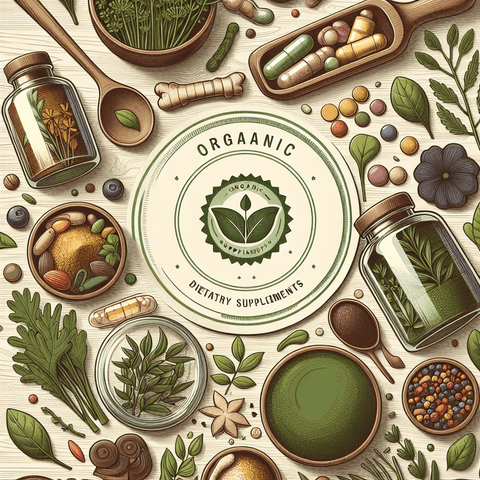In recent years, dietary supplements have experienced an unprecedented surge in popularity among health-conscious consumers worldwide. From athletes seeking performance boosts to older adults aiming to preserve mobility, supplements have become a staple in many people’s wellness routines. Among the myriad options available, organic supplements have gained particular attention, boasting claims of enhanced efficacy, purity, and environmental sustainability. But amidst this booming market, an important question emerges: Are organic supplements truly more effective and worth the investment? This comprehensive review aims to dissect this query by exploring what sets organic supplements apart, their health benefits, safety and quality considerations, the role of plant-based nutrients, immune support, and the significance of clean label products. Ultimately, consumers need validated information to make informed decisions about their health investments, and this post provides that clarity based on current scientific understanding and market insights.
1. Organic Supplements: What Sets Them Apart in the Nutritional Supplement Market?
To understand whether organic supplements are superior, it’s essential first to define what they are and how they differ from conventional options. Organic supplements are made from ingredients that are grown and processed according to strict standards that prohibit the use of synthetic fertilizers, pesticides, genetically modified organisms (GMOs), artificial preservatives, and synthetic chemicals. Certification programs such as the USDA Organic and ECOCERT set rigorous guidelines, ensuring that products meet specific criteria for purity, cultivation practices, and processing methods.
Common types of organic supplements include vitamins, minerals, herbal extracts, superfoods, and plant-based powders. For example, organic turmeric extracts, organic spirulina, or organic multivitamins sourced from plant materials are widely available and popular due to the perceived health and environmental benefits. Choosing organic reduces exposure to potentially harmful residues of pesticides and synthetic chemicals, which some consumers find especially relevant in the context of long-term health and ecological sustainability.
The scientific basis for the benefits of organic supplements hinges on their minimal processing and adherence to natural cultivation practices. While the scientific community continues to explore the differential impacts of organic versus conventionally-grown produce and ingredients, many studies suggest that organic products tend to retain higher levels of certain phytochemicals, antioxidants, and nutrients owing to less aggressive farming practices. However, it's vital to recognize that organic certification doesn’t inherently guarantee higher nutrient content but emphasizes purity, sustainability, and compliance with stringent standards.
In terms of cost, organic supplements often command higher prices due to more labor-intensive farming practices, certification costs, and careful processing. Yet, consumers are often willing to pay a premium for products they perceive as safer, purer, and more environmentally friendly. Availability can be a limiting factor, especially in regions with less developed organic markets, but the overall trend shows a growing presence of certified organic supplement options in health stores and online.
Scientific evidence supports that organic ingredients can offer higher purity levels, with fewer contaminants and synthetic residues compared to non-organic counterparts. This is especially crucial for vulnerable groups such as pregnant women or individuals with sensitivities. However, it’s important to note that organic does not automatically mean more potent; the efficacy of a supplement still depends on its bioactive compounds, formulation, and dosage.
2. Natural Health Benefits of Organic Supplements and Their Impact on Well-being
The appeal of organic supplements often stems from the belief that “natural” equals “safer” and “more effective.” While the scientific evidence is nuanced, many organic nutrients do support overall health by providing bioactive compounds, antioxidants, and phytochemicals that support physiological functions. For example, organic herbal supplements such as echinacea or elderberry are rich in flavonoids and polyphenols, which have been studied for their potential immune-modulating properties.
Research indicates that organic plant-based nutrients may better contribute to health by reducing oxidative stress — a key factor in aging and chronic diseases. Oxidative stress occurs due to an imbalance between free radicals and antioxidants in the body. Many organic vegetables, fruits, and herbs are high in polyphenols and flavonoids, which can neutralize free radicals and reduce inflammation. For example, organic berries have shown higher levels of antioxidants like anthocyanins, which support cardiovascular health and cognitive function.
Moreover, organic supplements generally contain fewer additives and synthetic preservatives that can trigger allergic reactions or adverse effects in sensitive individuals. Digestive health benefits, too, are notable; organic fibers and herbal extracts can stimulate gut microbiota diversity and improve digestion without the concern of residual pesticide contaminants. Some clinical studies have pointed towards improved outcomes in participants taking organic supplements, particularly when these products contain higher levels of active phytochemicals.
Personal anecdotes and testimonials frequently support these scientific data, citing better tolerated formulations with fewer side effects and a sense of “cleaner” health improvements. However, it’s worth emphasizing that individual responses vary, and supplement efficacy depends heavily on correct dosing, bioavailability, and baseline nutritional status.
3. Organic Supplement Quality: Ensuring Purity, Potency, and Safety
Ensuring the quality of organic supplements requires rigorous manufacturing standards, sourcing transparency, and thorough testing. Proper sourcing begins with selecting organic-certified ingredients, which must be cultivated without synthetics, pesticides, or GMOs, and processed in facilities that adhere to Good Manufacturing Practices (GMP). These steps help maintain product purity, potency, and safety.
One crucial element is third-party testing and certification. Trusted organizations such as NSF International or US Pharmacopeia verify that the product contains the listed active ingredients at declared levels and is free from contaminants like heavy metals, microbial pathogens, or residual pesticides. Many premium brands include batch testing certificates and detailed ingredient sourcing information to instill consumer confidence.
Sourcing influences not only safety but also bioavailability—the extent to which nutrients are absorbed and utilized by the body. Organic plant ingredients often retain higher levels of bioactive compounds due to gentler processing methods. Proper formulation and encapsulation techniques also improve nutrient stability and absorption, which directly impact supplement efficacy.
Addressing concerns about adulteration or fraud remains critical. The supplement industry has faced challenges with mislabeling or contamination; therefore, choosing brands with transparent sourcing, clear certification, and reliable third-party testing is advisable. Furthermore, sustainability is integral—not only for environmental benefits but also because sustainable farming practices typically support better soil health and nutrient density in crops.
4. Plant-Based Nutrients: Harnessing Nature’s Power for Better Health
Plant-based nutrients are vital components of organic supplements, offering a broad spectrum of bioactive compounds that confer health benefits. Polyphenols, flavonoids, carotenoids, and other phytochemicals act as antioxidants, anti-inflammatory agents, and immune modulators. Their presence in organic plant-based supplements is especially significant, as cultivation methods impact phytochemical levels.
Compared to conventional sources, organic plant-derived nutrients are often preserved in their natural form, with fewer synthetic stabilizers or preservatives that can diminish their potency. For example, organic green powders and superfoods like spirulina or chlorella contain high levels of chlorophyll, antioxidants, and essential amino acids, which support cardiovascular health, cognitive function, and longevity.
Scientific studies consistently show that organic plant-based supplements often have higher phytochemical content and bioavailability. For instance, organic berries tend to have elevated anthocyanins compared to conventionally grown berries, facilitating better absorption and antioxidant activity. This bioavailability is crucial, as the efficacy of plant compounds hinges significantly on their chemical form and concentration.
Growing consumer interest in veganism and plant-based lifestyles has catalyzed the development of organic herbal extracts and superfoods. Products like organic turmeric, rich in curcuminoids, or organic ginger contain bioactive compounds with well-documented health-promoting properties. These supplements are often preferred for their natural origins and minimal processing, aligning with health-conscious and environmentally aware consumers.
5. Immune Support Supplements: Enhancing Defense with Organic Ingredients
Immune health has become a central concern for many consumers, especially in the wake of global health challenges. Organic immune support supplements typically include ingredients like echinacea, elderberry, turmeric, and vitamin C, which are known for their roles in supporting immune function.
Organic formulations are preferred by some because they avoid synthetic preservatives, artificial colors, or unnecessary fillers that could otherwise diminish the supplement’s purity. For example, organic elderberry extract provides a concentrated source of anthocyanins with potential immune-enhancing effects, supported by some clinical evidence.
Research indicates that certain organic ingredients can modulate immune responses without overstimulation or adverse effects. For instance, turmeric’s curcumin exhibits anti-inflammatory and antimicrobial properties, which can help maintain balanced immune activity. Likewise, organic vitamin C sourced from natural citrus extracts can contribute to immune resilience and overall health protection.
When selecting organic immune-support supplements, consumers should look for products with transparent ingredient sourcing, clear dosing information, and third-party testing. Combining these with a balanced diet, adequate sleep, and regular exercise optimizes immune health.
6. Clean Label Vitamins: Transparency, Trust, and Efficacy
The modern consumer increasingly demands transparency in the ingredients, sourcing, and manufacturing processes of health supplements. Clean label vitamins embody this movement, emphasizing minimal, recognizable ingredients with no artificial fillers, dyes, unnatural preservatives, or misleading claims.
Many clean label vitamins also follow organic principles, offering products free of synthetic chemicals and contaminants. This enhances consumer trust, especially among those with sensitivities or seeking eco-friendly options. For example, vitamins made with organic plant-based ingredients, free from artificial colors or flavors, align perfectly with the ethos of natural health support.
Minimal processing ensures that active nutrients are retained in their natural state, leading to potentially better efficacy. Additionally, avoiding artificial additives reduces the risk of adverse reactions and allergies, making clean label products particularly suitable for sensitive individuals.
Consumers should prioritize reputable brands with transparent ingredient sourcing, clear labels, and third-party certifications. In doing so, they can confidently choose supplements that align with their health goals and ethical values.
Conclusion
In summary, organic supplements hold distinct advantages—namely, higher purity, lower contaminant levels, and alignment with sustainable and ethical farming practices. While scientific evidence suggests that organic ingredients may provide higher levels of certain phytochemicals and antioxidants, efficacy ultimately depends on formulation, bioavailability, and individual factors.
Considering their potential benefits alongside the higher costs, consumers should evaluate their health priorities and ethical considerations. Choosing high-quality organic supplements backed by third-party testing, and complemented by a balanced lifestyle, can optimize health outcomes.
Before making significant changes or investing in premium supplements, consulting healthcare professionals is advised to ensure alignment with individual health needs. As awareness grows, the market continues to evolve, offering more transparent, clean-label, and organic options—empowering consumers to make informed, health-conscious choices today!
Q&A Section
Q1: Are organic supplements more effective than conventional ones?
Effectiveness depends on the specific nutrients and individual needs. While organic ingredients often contain higher levels of phytochemicals and antioxidants, the overall efficacy of a supplement also depends on formulation, bioavailability, and dosage. Scientific studies suggest potential benefits, but they do not universally prove superior efficacy across all products.
Q2: Do organic supplements cost more? Are they worth the extra investment?
Yes, organic supplements typically cost more due to higher production and certification costs. Whether they are worth the investment depends on personal priorities regarding purity, safety, environmental impact, and ethics. Many consumers consider the higher costs justified for products they perceive as safer and more sustainable.
Q3: How can I ensure the quality and safety of organic supplements?
Look for reputable brands with third-party testing, transparent sourcing, and certified organic labels. Check for GMP compliance and detailed ingredient information. Choosing products that undergo regular testing reduces risks of contamination or adulteration.
Q4: Are organic supplements suitable for everyone?
In general, they are suitable for most people seeking natural products; however, individuals with specific health conditions or allergies should consult healthcare professionals before use. Organic does not necessarily mean allergen-free or universally appropriate for all individuals.
Q5: Can organic supplements replace a balanced diet?
No, supplements are intended to complement a balanced diet, not replace it. Whole foods provide a complex matrix of nutrients and fiber that supplements cannot fully replicate.
Important Keywords
- Organic supplements
- Natural health benefits
- Supplement quality and safety
- Plant-based nutrients
- Immune support supplements
- Clean label vitamins
- Sustainable nutrition
- Bioavailability of phytochemicals
- Third-party testing
- Certified organic vitamins



